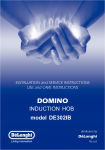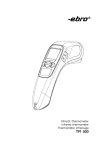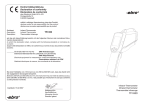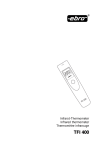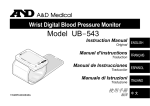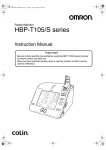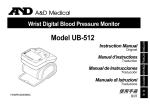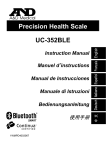Download A&D UT-302PBT User's Manual
Transcript
DIGITAL BLUETOOTH THEROMETER PBT Index 1. Introduction 1 2. Important Information Before Use 2 3. Product Identification 3 4. Description of LCD Display 3 5. Battery Installation 4 6. Changing Modes (°C/°F Switchable) 5 7. Tips for Measuring Human Temperature 6 8. Measuring Body Temperature in the Ear 7 9. Memory Function 10 10. Operating The Bluetooth Function 11 11. Care and Maintenance 14 12. Applied Standards 14 13. Error Codes 15 14. Technical Specifications 15 15. FCC Statement 16 16. EMC Tables 18 Introduction Utilizing infrared technology, this thermometer takes temperatures in seconds by measuring heat generated by the ear canal or other objects . This product conforms to the provisions of the EC directive MDD(93/42/EEC).Its advantages include: 1. Wireless communication : Bluetooth (class 2) 2. Intended use: For home, clinic, and hospital use to determine human body temperature. 3. Illuminated back-light display 4. 10 user memory 5. °C/°F switchable f unction 6. Probe cover free 7. Waterproof probe design 8. One-second reading 9. Auto power off for power saving 10. Low-battery i ndicator 11. Warning indication for battery condition and measuring range. 12. Large LCD display 1 Important Information Before Use When using this product, please be sure to follow all the notes listed below. Any action against these notices may cause injury or affect the accuracy. 1. Do not disassemble, repair, or remodel the thermometer. 2. Be sure to clean the thermometer lens each time after usage. 3. Avoid direct finger contact with the lens. 4. No modification of this equipment is allowed. 5. It is recommended that user take 3 temperatures. If they are different, use the average reading. 6. Do not expose the thermometer to extreme temperature, very high humidity, or direct sunlight. 7. Avoid extreme shock or dropping the device. 8. Before the measurement, patients and thermometer should stay in steady state room condition for at least 30 minutes. 9. Avoid measuring temperature in 30 minutes after exercise, bathing, or returning from outdoor. 10. To protect the environment, dispose of empty batteries at appropriate collection sites according to national or local regulations. 11. Please use the thermometer solely for its intended purpose. 12. Carefully hold the device when in use to avoid dropping the device. 13. Allow one minute between successive measurements as slight variations may occur if measurements are taken over a short period of time. Use average temperatures instead. 14. There are no absolute body temperature standards. Keep reliable records of your personal temperature to serve as a reference for judging a fever. 15. Under any circumstances, the temperature taking result is ONLY for reference. Before taking any medical action, please consult your physician. 2 Product Identification Probe Tip LED (Wireless connecting indicator) Wireless Reset Key Wireless Power Button MEMORY Recall Button Power & Measure Button LCD Display Battery compartment lid Description of LCD Display Degrees of Temperature Memory Symbol and Sets of Records Smiling face Indicating temperature is lower than 38°C (100.4°F) Frowning face Indicating temperature is equal or higher than 38°C (100.4°F) Low battery Warning 3 Celsius Scale Fahrenheit Scale Scan in Progress Battery Installation Low battery warning: When the battery power becomes low, the low battery symbol “ ” will appear on the display. The thermometer can still be used during this time, but the batteries should be replaced as soon as possible. If the batteries run out completely, “Lo” will be displayed along with the low battery symbol. In this case, the batteries will need to be replaced before using the thermometer again. Replacing the Battery: 1. Use a Phillips head screwdriver to loosen battery cover screw. Remove the battery cover. 2. Insert or replace 2 x 1.5 V AAA alkaline batteries into the battery compartment, ensuring to match the indicated polarity symbols. Always use new batteries. 3. Place the battery cover on the thermometer and tighten the screw to secure it in place. Battery-operated 1. Please properly dispose of the batteries away from small children and heat. 2. It is recommended to remove the batteries if the unit will not be used for an extended period of time. 3. Batteries must be disposed of in accordance with local environmental and institutional policies. 4 Changing Modes (°C/°F Switchable ) This thermometer can display result in either degrees Fahrenheit(°F) or degrees Celsius(°C). Changing °C/ °F, please make sure the device is in power on condition. Press the Power/Scan button, hold it, and then press the Memory button to toggle between °C and °F. 5 Tips for Measuring Human Temperature Bear in mind that the thermometer needs to have been in the room in which the measurement is taken for at least 30 minutes before use. • Some people produce different readings in their left and right ear. In order to record temperature changes, always measure a person’s temperature in the same ear. • The ear thermometer may be used by children only under adult supervision. Measurement is usually possible over the age of 6 months. In infants under 6 months, the ear canal is still very narrow so the temperature of the eardrum often cannot be recorded and the result displayed is often too low. • The measurement must not be taken in an ear affected by inflammatory diseases (e.g. discharging pus or secretion), after possible ear injuries (e.g. eardrum damage) or in the healing period after operative procedures. In all of these cases, please consult your doctor. • Use of the thermometer on different persons can be inappropriate in the event of certain acute infectious diseases because of the possible spread of germs despite cleaning and disinfection. If you have any doubts, please consult your doctor. • This thermometer may only be used without a disposable protective cover. • If you have been lying on one ear for some time, the temperature is slightly raised. Wait a little while or measure in the other ear. • As ear wax can affect the measurement, you should clean the ear before measuring if necessary. 6 Measuring Body Temperature in the Ear 1. Remove the front cover: Remove the cover cap: Remove the cap by gently pushing it up (1) and then pulling it off forwards (2). 2. Press the Power button to switch the thermometer on. Following a successful self test, the device emits two short beeps. 3. Make sure that the sensor tip and also the ear canal are clean. As the ear canal is slightly curved, you have to pull the ear slightly up and backwards before inserting the sensor tip. This is important so that the sensor tip can be pointed directly at the eardrum. 4. Insert the probe into the ear canal (the probe must insert well to ensure an accurate temperature measurement), then press the “Power & Measure” button for about 1 second, release the button and you will hear 1 short beep sound means complete the measurement. 7 Measuring Body Temperature in the Ear • Under 1 year: Have child lay flat with the head sideways, so that the ear is facing upwards. Gently pull the ear straight back. • 1 year +: Stand behind and slightly to the side of the child/adult. Gently pull the ear up and back to straighten the ear canal. 5. You may take out the device to read the measurement result. 6. The backlight display will remain light for approximately 5 seconds each time the “Power & Measure” button is pressed, after each reading is completed, and each time the “Memory” button is pressed to recall a previous reading. 7. The thermometer will automatically shut off after one minute without use. 1. To ensure accuracy, please wait at least 20 seconds between successive readings. 2. Clean the thermometer lens again after use. Wait at least 10 minutes between consecutive readings, to ensure accuracy. 8 Measuring Body Temperature in the Ear The Readings: If the temperature measurement is below 38°C, a “Smiling Face ” will be appear next to the reading. If the reading is 38°C or above, a “Frowning Face ” will be displayed. 9 Memory Function Memory Recall: You can recall up to 10 measurements of all currently stored measurements in memory to share with your physician or trained healthcare professional. 1. While in power on mode, press once briefly on the “Memory” button, then pass it again to show the last measurement accompanied by “ ” symbol. 2. Continue to press the “Memory” button to view the next previously stored measurement, so “ ” then all the way to “ ”. 3. Automatically on the 11th measurement: when the 10 memories have been used up, any new measurement will be recorded and the oldest memory deleted. 10 Operating The Bluetooth Function 1. Turn the ear thermometer to the back side. 2. Turn on the wireless power (From "off" to "on"), while the thermometer searches for other Bluetooth compatible devices, the LED (connection indicator) will flash. When the device connects successfully to health monitoring devices and Bluetooth-capable devices, such as a computer, PDA, or mobile phone, the LED will remain lit. At conclusion of temperature measurement, the reading will be sent to the health monitoring device and the reading will automatically stored in memory. 3. To disconnect from health monitoring devices, turn off the wireless power (From "on" to "off"), and the LED will no longer be lit. 11 Operating The Bluetooth Function What You Need: The host computer or terminal system to run Serial Port Profile (SPP) - A personal computer with Operating system: Windows 95 or later - A Smart Phone with Android system - Others: PDA, etc. Please refer to the instruction manual of your personal computer for how to install Serial Port Profile (SPP). Bluetooth LED: FAST BLINKING: indicate this UT-302 PBT is at linking state waiting to be linked by other Bluetooth terminal system like Smart Phone. SLOW B LINKING: indicat e UT-302 PBT is waiting for c onnection from other m aster B luetooth device. ACTIVE: indicate Bluetooth c onnection h ave b een established successfully 12 Operating The Bluetooth Function Communications Interface: Using Bluetooth communications terms, the UT-302PBT is a slave device. To connect the UT-302PBT to a master device you must initiate the connection by first pairing with the UT-302PBT. To complete the pairing process the “0000” number must be provided to the master as the Bluetooth Pass Key (Bluetooth PIN Code). Once the pairing is complete the UT-302PBT will automatically reconnect to the master device when possible. The four digit Bluetooth Pass Key must be entered only during the pairing to a new master To connect to a new device (new master) the UT-302PBT must be out of range from the previous master or unpaired from that master. 13 Care and Maintenance • Probe and Tip: Clean the probe and tip with an alcohol swab before and after each measurement. • Thermometer: Use a soft, dry cloth to clean thermometer body. Never use abrasive cleaning agents, thinners or benzene for cleaning. Do not scratch the surface of the probe lens or the display. Do not expose the thermometer to extreme temperatures, humidity, direct sunlight, or shock. Applied Standards This product conforms to the provisions of the EC directive MDD (93/42/EEC). The following standards apply to design and/or manufacture of the products: . E N12470- 5 Clinical thermometers-Part 5: Performance of infrared ear Thermometers (with maximum device) . A ST M E 1965-98 Standard Specification for Infrared Thermometers for Intermittent Determination of Patient Temperature. . IEC/EN 60601-1 Medical electrical equipment-Part1: General requirements for safety. . IEC/EN 60601-1-2 Medical electrical equipment-Part2: Collateral standard: Electromagnetic compatibilityRequirements and tests. 14 Error Codes When a malfunction or incorrect temperature measurement occurs, an error message will appear as described below. LCD Display Cause Solution The temperature measured is lower than 34°C (93.2°F) The temperature measured is higher than 43°C (109.4°F) The operating temperature is not in the range from 16°C~35°C (60.8°F~95.0°F) Operate the thermometer only between the specified temperature ranges. If necessary, clean the sensor tip. In the event of a repeated error message, contact your retailer or Customer Services. Operate the thermometer only between the specified temperature ranges. Technical Specifications • Measuring range : 34°C~43°C (93.2°F~109.4°F) • Measuring accuracy : 35.5°C~42°C (95.9°F~107.6°F): ±0.2°C(0.4°F) ±0.3°C(0.5°F) outside the range: • Operating environment: o o o o 16 C~35 C (60.8 F~95 F) with relative humidity up to 85% (non condensing) • Storage/ Transportation environment: o o o o -25 C~+55 C (-13 F~+131 F) with relative humidity up to 85% (non condensing) o o • Display resolution: 0.1 C or F • Power supply : 2 x 1.5 V AAA alkaline batteries • Weight : approx. 70g (without batteries) • Dimensions : approx. 6.2in x 1.7in x 2.1in (L x W x H) 15 FCC Statement This equipment has been tested and found to comply with the limits for a Class B digital device, pursuant to Part 15 of the FCC Rules. These limits are designed to provide reasonable protection against harmful interference in a residential installation. This equipment generates, uses, and can radiate radio frequency energy and, if not installed and used in accordance with the instructions, may cause harmful interference to radio communications. However, there is no guarantee that interference will not occur in a particular installation. If this equipment does cause harmful interference to radio or television reception, which can be determined by turning the equipment off and on, the user is encouraged to try to correct the interference by one of the following measures: 1. Reorient or relocate the receiving antenna. 2. Increase the separation between the equipment and receiver. 3. Connect the equipment into an outlet on a circuit different from that to which the receiver is connected. 4. Consult the dealer or an experienced audio/TV technician for help. 5. FCC Caution: To assure continued compliance, (example – use only shielded interface cables when connecting to computer or peripheral devices). Any changes or modifications not expressly approved by the party responsible for compliance could void the user’s authority to operate this equipment. 16 FCC Statement 6. This device complies with Part 15 of the FCC Rules. Operation is subject to the following two conditions: (1) this device may not cause harmful interference, and (2) this device must accept any interference received, including interference that may cause undesired operation. 7. This device complies with FCC radiation exposure limits set forth for an uncontrolled environment. End users must follow the specific operating instructions for satisfying RF exposure compliance. This transmitter must not be co-located or operating in conjunction with any other antenna or transmitter. 17 EMC Tables Guidance and manufacturer's declaration-electromagnetic emission The UT-302PBT Thermometer is intended for use in the electromagnetic environment specified below. The customer or the user of the UT-302PBT Thermometer should assure that it is used in such an environment. Emissions test RF emissions Compliance CISPR 11 RF emissions CISPR 11 Class B Harmonic emissions IEC 61000-3-2 Not applicable Voltage fluctuations/ flicker emissions IEC 61000-3-3 Not applicable Electromagnetic environment guidance Group 1 The UT-302PBT Thermometer uses RF energy only for its internal function. Therefore, its RF emissions are very low and are not likely to cause any interference in nearby electronic equipment. The UT-302PBT Thermometer is suitable for use in all establishments, including domestic establishments and those directly connected to the public low-voltage power supply network that supplies buildings used for domestic purposes. Guidance and manufacturer's declaration-electromagnetic immunity The UT-302PBT Thermometer is intended for use in the electromagnetic environment specified below. The customer or the user of the UT-302PBT Thermometer should assure that it is used in such an environment. Immunity test Electrostatic discharge (ESD) IEC 61000-4-2 IEC 60601 test level ± 6 kV contact ± 8 kV air Power frequency 3 A/m (50/60 Hz) magnetic field IEC 61000-4-8 Compliance level Electromagnetic environment-guidance ± 6 kV contact ± 8 kV air Floors should be wood, concrete or ceramic tile. If floors are covered with synthetic material, the relative humidity should be at least 30 %. 3 A/m Power frequency magnetic fields should be at levels characteristic of a typical location in a typical. 18 EMC Tables Guidance and manufacturer's declaration-electromagnetic immunity The UT-302PBT Thermometer is intended for use in the electromagnetic environment specified below.The customer or the user of the UT-302PBT Thermometer should assure that it is used in such an environment . Immunity IEC 60601 test Compliance test level l evel Radiated 3 V/m RF IEC 80 MHz to 2,5 61000-4-3 GHz 3 V/m Electromagnetic environment-guidance Portable and mobile RF communications equipment should be used no closer to any part of the UT-302PBT Thermometer , including cables, than the recommended separation distance calculated from the equation applicable to the frequency of the transmitter. Recommended separation distance d=1.2 √ P d=1.2 √ P 80 MHz to 800 MHZ d=2.3 √ P 800 MHz to 2,5 Ghz where P is the maximum output power rating of the transmitter in watts (W) according to the transmitter manufacturer and d is the recommended separation distance in metres (m). Field strengths from fixed RF transmitters, as determined by an electromagnetic site survey-a, should be less than the compliance level in each frequency range-b. Interference may occur in the vicinity of equipment marked with the following symbol: NOTE 1. At 80 MHz and 800 MHz, the higher frequency range applies. NOTE 2. These guidelines may not apply in all situations. Electromagnetic propagation is affected by absorption and reflection from structures, objects and people. a. Field strengths from fixed transmitters, such as base stations for radio (cellular/cordless) telephones and land mobile radios, amateur radio, AM and FM radio broadcast and TV broadcast cannot be predicted theoretically with accuracy. To assess the electromagnetic environment due to fixed RF transmitters, an electromagnetic site survey should be considered. If the measured field strength in the location in which the UT-302PBT Thermometer is used exceeds the applicable RF compliance level above, the UT-302PBT Thermometer should be observed to verify normal operation. If abnormal performance is observed, additional measures may be necessary, such as reorienting or relocating the UT-302PBT Thermometer. b. Over the frequency range 150 kHz to 80 MHz, field strengths should be less than 3 V/m. 19 EMC Tables Recommended separation distances between portable and mobile RF communications equipment and the UT-302PBT Thermometer The UT-302PBT Thermometer monitor is intended for use in an electromagnetic environment in which radiated RF disturbances are controlled. The customer or the user of the UT-302PBT Thermometer can help prevent electromagnetic interference by maintaining a minimum distance between portable and mobile RF communications equipment (transmitters) and the UT-302PBT Thermometer as recommended below, according to the maximum output power of the communications equipment. Rated maximum output power of transmitter W Separation distance according to frequency of transmitter m 150 kHz to 80 MHZ d=1.2 √ P 80 MHz to 800 MHZ d=1.2 √ P 800 MHz to 2.5 GHz d=1.2 √ P 0.23 0.12 0.01 0.12 0.73 0.38 0.1 0.38 2.3 1.2 1 1.2 7.3 3.8 10 3.8 23 12 100 12 For transmitters rated at a maximum output power not listed above, the recommended separation distance d in metres (m) can be estimated using the equation applicable to the frequency of the transmitter, where P is the maximum output power rating of the transmitter in watts (W) according to the transmitter manufacturer. NOTE 1. At 80 MHz and 800 MHz, the separation distance for the higher frequency range applies. NOTE 2. These guidelines may not apply in all situations. Electromagnetic propagation is affected by absorption and reflection from structures, objects and people. 20 This device includes RF transmitter (with wireless communication) 21 A&D Company, Limited 1-243 Asahi, Kitamoto-shi, Saitama 364-8585 JAPAN Telephone: [81](48)593-1111 Fax: [81](48)593-1119 A&D INSTRUMENTS LTD. Unit 24/26 Blacklands Way, Abingdon Business Park, Abingdon, Oxfordshire OX14 1DY United Kingdom Telephone: [44](1235)550420 Fax: [44](1235)550485 A&D ENGINEERING, INC. 1756 Automation Parkway, San Jose, California 95131 USA Telephone: [1](408)263-5333 Fax: [1](408)263-0119 A&D AUSTRALASIA PTY.LTD. 32 Dew Street, Thebarton, South Australia 5031 AUSTRALIA Telephone: [61](8)352-3033 Fax: [61](8)352-7409 © 2014 A&D Medical. All rights reserved.
























